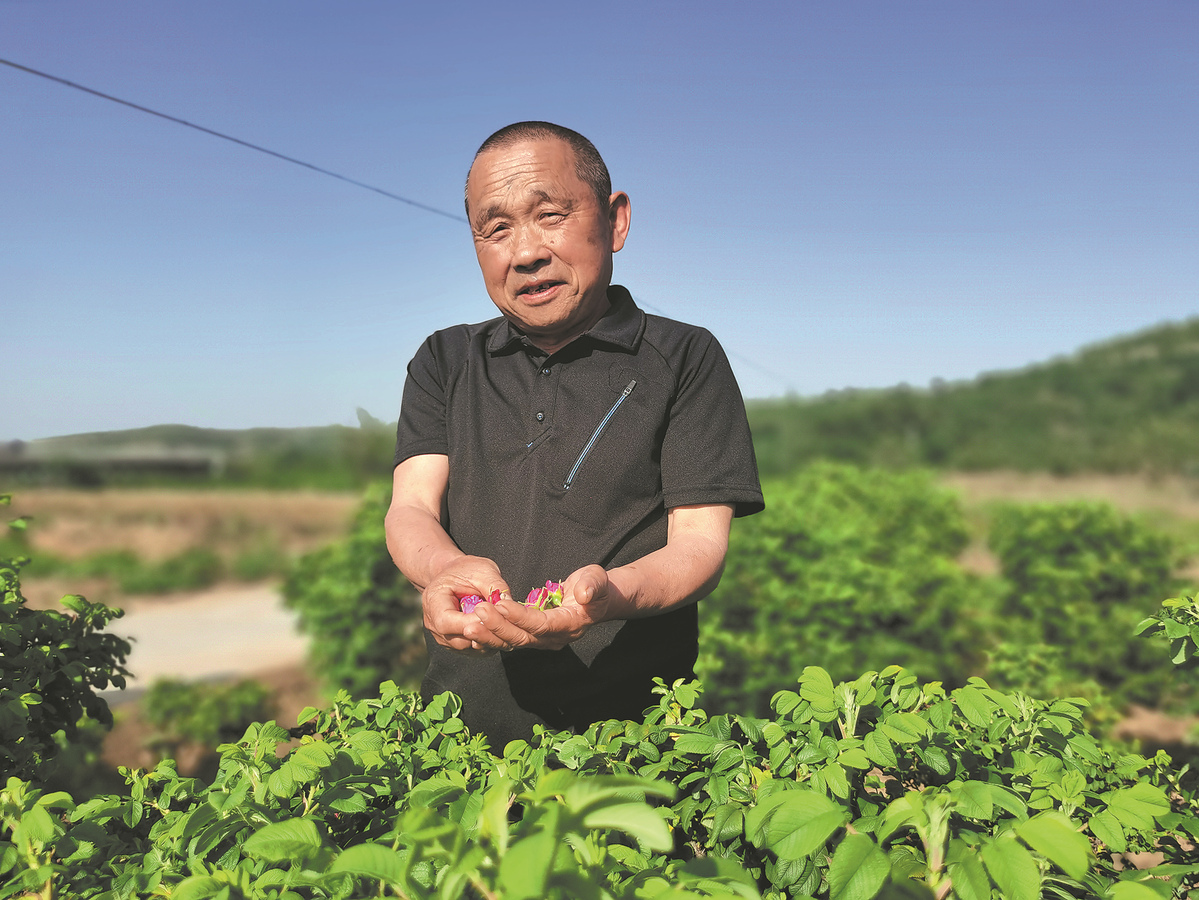

The flower industry has become a "bountiful" sector that promotes rural development in Shandong province.
In early June, Yao Chuanxin, a farmer in Nantai village of Pingyin county, Shandong province, came to his rose field to pick the last roses for the year. His busiest time in harvesting roses is April and May when the flowers start to bloom.
Yao, 69, grows one mu (0.067 hectares) of roses on a hillside in a village famous for its meigui — "rose" in English — which sits at the foot of Cuiping mountain. He has been growing roses for several decades.
"Almost every household in our village grows roses because the soil and climate here are suitable for it," said Yao, adding that roses not only make his village very beautiful in April and May but bring good incomes to the villagers.
Pingyin county of Jinan has been planting roses for more than 1,300 years, said the county government. The county is now home to a rose planting area of about 4,000 hectares and more than 40 rose processing enterprises. Products made with roses in the county range from food and cosmetics to medicine, and have been sold to more than 10 countries and regions.
Yao and his fellow villagers used to sell roses to people who make rose wine and food, but now they sell their flowers to companies in their town.
In the town, a company that produces rose products is nestled among a large rose field. Roses collected in the early morning are transported to the company's production lines within a short time.
Rose corolla, typically used for tea, collected between 3 am and 6 am, has the best nutritional value.
"We dry the corolla with our technologies as soon as it is transported to our production line to maintain the nutrition," said Zhang Jifang, vice-chairman of Huamei Biology Co Ltd.
To help farmers grow roses easier and earn more, the county government has built a big data platform to provide them with growing data such as weather and marketing.
"We integrate the rose industry with information technologies such as cloud computing and the internet of things, which are networks of devices that can connect and exchange data to build a big data center, on which growing information is collected and analyzed by the system," said Zhao Bo, director of the county's rose industry development center.
Roses, buds, corolla and large flowers have different values. For example, corolla that has a high essential oil content is twice as expensive as large flowers, he said.
"Therefore, when to pick the flowers and how to prevent weather disasters matter to farmers' incomes," he said.
The county has divided the rose fields into six blocks where IoT is used to collect data on the soil, light, humidity and growing state of the flowers in real time. These data are sent to farmers according to which farmers can assist in preventing weather disasters, and therefore decide when to pick the flowers.
"The rose growing industry has enriched our lives," said Tao Xilu, Party secretary of Taozhuang village, which has a population of over 400.
The village's cooperative has an income of 800,000 yuan ($111,711) from the rose industry, said Tao.
With the income, life quality of the villagers has improved.
In the village, a canteen for elderly people was put into service last year. Every day, around 40 seniors eat lunch in the canteen for free, said Tao.
The canteen is part of the functions of the livelihood complex built in the village. The complex also provides elderly care services including bathing and entertainment.
In Chengwu county of Heze, peonies are beautifying farmers' lives. In May, when over 1 million peonies in the Jiunyu mountain peony garden bloomed, a large number of tourists came to enjoy the colors and fragrances.
Some of the fresh peonies are made into fresh flower products after pruning, sorting and packaging, and are then sold across China.
"Our fresh peonies are mainly sold to Beijing, Shanghai and Guangzhou in Guangdong province, with over 20,000 stems sold every day in May," said Feng Xueting who oversees the garden.
"As fresh peony products are gaining more markets, we plan to expand our growing areas," said Feng.